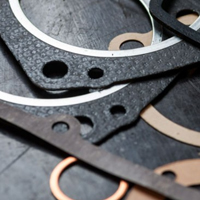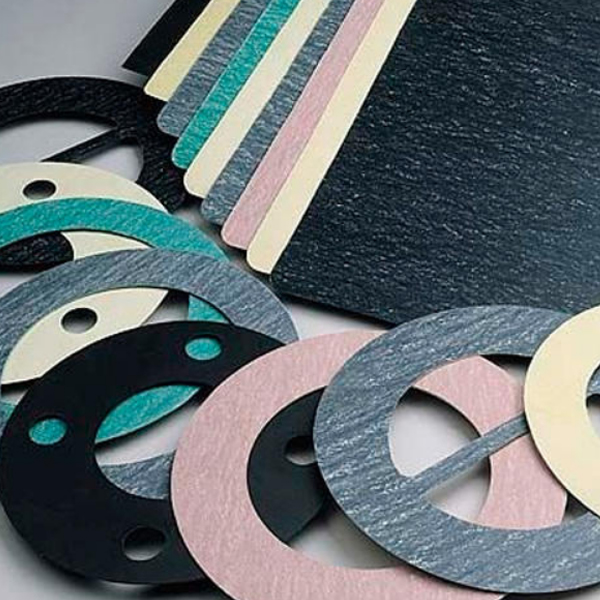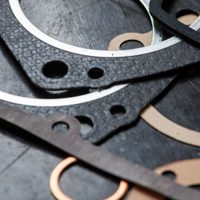CUSTOM DIE CUT GASKETS
Custom Die Cut Gaskets: We Have What You Need

Midwest Gasket is pleased to offer a specialized service in the creation of custom die-cut gaskets tailored to meet specific industrial needs. Our expert team employs a precise die-cutting process to craft these specialized seals, utilizing materials such as rubber, silicone, or other gasket materials. These customized gaskets find applications across diverse industries, providing effective solutions for sealing, leak prevention, vibration dampening, and insulation against heat or electricity. The customization aspect ensures that each gasket is precisely tailored to meet specific requirements, while our die-cutting process guarantees uniformity and precision in shape and size. With material options including rubber, neoprene, cork, and various composites, Midwest Gasket's custom die-cut gaskets offer versatile and efficient solutions for achieving reliable seals in a variety of industrial settings.
| Primary Capabilities | Standard and Custom Die Cut Gaskets Specialty Die Cutting |
| Gasket Types | Non-metallic |
| Gasket Shapes | C-Shaped D-Shaped Diamond Hexagonal Notched Octagonal Oval Rectangular Square |
| Thickness | Up to 2in |
| Tolerance (+/-) | Up to .005in |
| Production Volume | Prototype to Production Low to High Volume |
| Typical Lead Time | 2 Weeks 24 Hour Emergency Service Same Day Quotes |
| Material (Non-Metal) | Adhesive Backed Material Air Filter Beater-Adol Butyl Ceramic Chip Board Cloth Composites Compressed Sheet Cork Cork Rubber Craft Foam Die Board Electrical Insulation EPDM Felt Fish Paper FKM Flexible Graphite Foam Foil Hard Board NBR Neoprene Nitrile Non-asbestos Pure Gum Floating Rubber SBR Silicone Sponge Urethane Viton® |
| Material (Plastic Polymers) | ABS Acrylic Fiberglass HDPE Marine Board Mylar Phenolic Polycarbonate Polyethylene PTFE PVC Sintra UHMW Vinyl |
| Additional Services | OEM Gasket Replication Engineering Assistance Reverse Engineering Design and Development Decorative elements Custom Lettering Custom Designs |
| Intended Applications | Signs Brackets Press Plates Insulators Spacers Washers Seals |
| Industries Served | Aeronautical Aerospace Appliance Architectural Automotive Aviation Consumer Products Construction Electrical and Electronics Food and Beverage Graphic Arts Heat and Insulation HVAC Hydraulics and Pneumatics Instruments and Controls Machinery and Equipment Marine Mechanical Systems Medical Military Pharmaceutical Point of Purchase Recreational Telecommunications Textile |
| Industry Standards | ASTM ANSI FDA OEM MIL-SPEC NSF UL |
| Certifications | ISO Certification |
| File Formats | AutoCAD (DWX, DWG) Teksoft ProCAD/CAM Adobe PDF |
Midwest Gasket specializes in manufacturing a diverse range of high-quality gaskets in various shapes to meet the needs of different industries. Their product line includes C-shaped, D-shaped, diamond, hexagonal, notched, octagonal, oval, rectangular, and square gaskets, each designed to provide reliable sealing solutions and enhance the performance of your machinery and equipment. Whether you need standard or custom sizes, Midwest Gasket can deliver precise and durable gaskets to suit your specific requirements.
Silicone rubber is widely employed in custom molding for its versatility and suitability across a broad spectrum of applications. It is frequently used to produce custom gaskets and seals, providing effective sealing due to its flexibility and resistance to extreme temperatures. In the medical field, silicone is utilized to create components for medical devices, benefiting from its biocompatibility and ease of sterilization. The consumer products sector takes advantage of custom-molded silicone for items like kitchenware and phone cases, while the automotive and aerospace industries rely on silicone for its resilience in the face of high temperatures and exposure to automotive fluids. Silicone's electrical insulating properties make it valuable in electronics, and it is also used in food processing and prototyping. Artists and sculptors use custom-molded silicone molds for detailed artwork. Selecting the right type of silicone, tailored to the specific application, is crucial for achieving the desired performance and safety standards.
Viton® is a brand of synthetic rubber renowned for its exceptional chemical resistance, high-temperature tolerance, and durability. Produced by the Chemours Company, it is widely used in custom molding for various applications. Viton® is highly resistant to harsh chemicals, making it suitable for manufacturing custom O-rings, gaskets, and seals in industries like automotive and chemical processing. It excels in high-temperature environments and is often employed in custom-molded parts for engines, exhaust systems, and industrial equipment. Additionally, Viton® finds use in custom-molded components for chemical processing equipment and as seals and insulation in applications requiring resistance to chemicals and extreme temperatures. However, its cost should be considered, as it is relatively more expensive compared to other rubber materials, necessitating a thoughtful assessment of specific application requirements.
Nitrile refers to both a group of organic compounds containing a cyano group (CN) and a type of synthetic rubber known as nitrile rubber (NBR). Nitrile compounds, or cyanides, are used in organic synthesis, while nitrile rubber is widely employed in various applications, such as gloves, gaskets, and seals, due to its excellent resistance to oil and chemicals.
Flexible graphite is a versatile material composed of exfoliated natural graphite, known for its high flexibility, elasticity, and conformability. Created by intercalating and expanding natural graphite flakes, it is compressed into sheets or foils. This material boasts excellent thermal and electrical conductivity, along with resistance to chemicals. Widely used in industrial applications, flexible graphite is employed in gaskets, seals, and packing materials where high temperatures and aggressive chemicals are prevalent. Its flexibility allows it to conform to irregular surfaces, making it an effective choice for creating seals in challenging environments in industries such as petrochemical, automotive, aerospace, and manufacturing.
EPDM (Ethylene Propylene Diene Monomer) is a synthetic rubber known for its versatility and excellent properties, including resistance to weathering, chemicals, and high temperatures. It is widely used in automotive seals, roofing membranes, electrical insulation, HVAC systems, and waterproofing applications due to its durability, flexibility, and weather resistance.
Cork rubber is a composite material that combines rubber with cork particles, blending the cushioning and resilience of cork with the compression set resistance and sealing properties of rubber. This composite material is lightweight, offers thermal insulation and vibration damping, and is commonly used in applications such as gaskets, seals, automotive components, and footwear insoles. It provides a balance of properties suitable for various industrial and commercial uses.
Closed-cell sponge refers to a type of foam material characterized by a cellular structure where individual cells are sealed, preventing the passage of air or liquids. Filled with gas, these closed cells make the material lightweight and provide insulation properties, making it resistant to moisture absorption. Commonly used in insulation, buoyancy aids, seals, gaskets, padding, and weather stripping, closed-cell sponges, made from materials like neoprene or PVC, are versatile due to their impermeability and ability to offer protection against temperature, impact, and weather conditions.
Copyright © 2022. Midwest Gasket Corp. | All rights reserved. | Industrial Website Catalog by WYSIWYG Marketing


